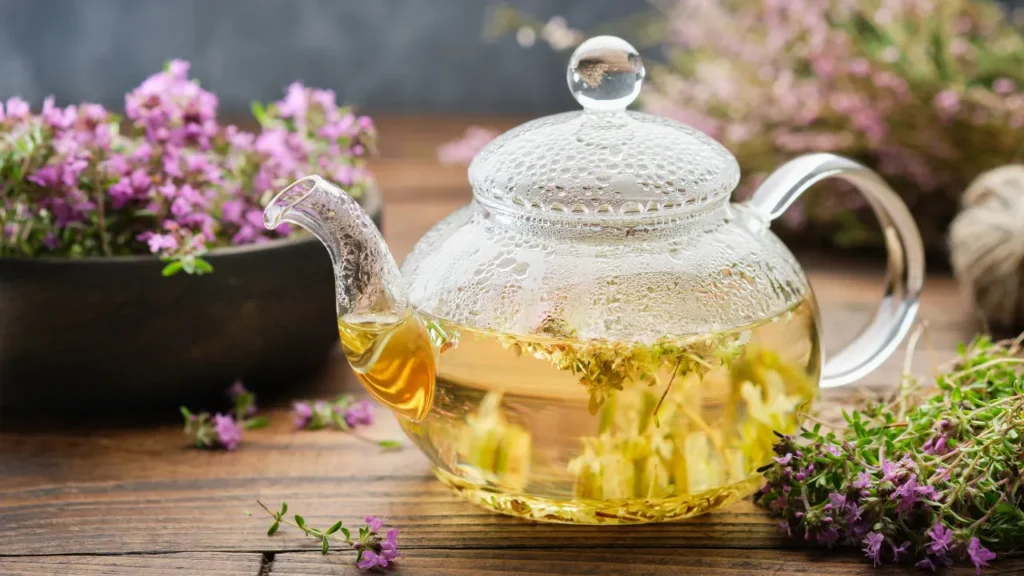Native to Europe, Asia, and North Africa is the perennial herb known as wild thyme (Thymus serpyllum). Wild thyme, a member of the Lamiaceae family, has long been valued for its therapeutic, culinary, and fragrant qualities. In-depth information about wild thyme, including its characteristics, health advantages, recommended dosage, possible side effects, drug interactions, and safe use, is provided on this page. Its chemical and physiological mechanisms of action will also be covered in great detail.
You May Also Like:
Diamond CBD Gummies vs. Joy Organics CBD Gummies
CBD for Concentration: 3 Epic Benefits that Boost Your Focus
Wild Thyme: Benefits, Dosage, Side Effects, Drug Interactions, And Other Important Information is an original (NootropicsPlanet) article.
Nature of Wild Thyme
The little, creeping plant known as wild thyme is distinguished by its purple-pink blossoms and short, elliptical leaves. The plant’s medicinal qualities are a result of its abundance in essential oils and other bioactive substances. Wild thyme has phenolic compounds, flavonoids, and terpenoids as its main phytochemicals.
1. Phenolic substances: Rosmarinic acid and caffeic acid, two phenolic compounds with potent antioxidant, anti-inflammatory, and antibacterial activities, are abundant in wild thyme.
2. Flavonoids: Flavonoids like apigenin, luteolin, and quercetin are found in wild thyme and have antioxidant, anti-inflammatory, and anticancer properties.
3. Terpenoids: Terpenoids, such as thymol and carvacrol, make up the majority of the wild thyme essential oil. These substances are well-known for having antibacterial, anti-inflammatory, and antioxidant effects.
Health Benefits of Wild Thyme
Traditional medicine has employed the bioactive ingredients in wild thyme to treat a variety of diseases. The mechanics underlying its advantages are starting to be clarified by recent scientific studies. The following are some of the main health advantages of wild thyme:
1. Antibacterial Qualities: The terpenoids in wild thyme essential oil, like thymol and carvacrol, have strong antibacterial effects against a variety of pathogens, including bacteria, fungi, and viruses.
2. Anti-inflammatory effects: It has been demonstrated that the flavonoids and phenolic compounds in wild thyme inhibit the synthesis of pro-inflammatory mediators like cytokines and nitric oxide, decreasing inflammation in the body.
3. Antioxidant activity: Wild thyme is a strong source of antioxidants that can scavenge free radicals and lessen oxidative stress, which is thought to contribute to the emergence of chronic illnesses like cancer, cardiovascular disease, and neurological disorders.
4. Respiratory health: Coughs, bronchitis, and asthma have all been traditionally treated with wild thyme. Its anti-inflammatory and antibacterial qualities can aid in reducing inflammation and battling respiratory tract infections.
5. Digestive health: gastrointestinal pain like indigestion, flatulence, and bloating have been treated with wild thyme. The smooth muscles of the digestive tract can be relaxed by its carminative and antispasmodic qualities, which can also assist to promote good digestion.

Chemistry of Wild Thyme
The medicinal benefits of wild thyme (Thymus serpyllum) are a result of its bioactive components. The main categories of phytochemicals found in wild thyme are:
1. Phenolic substances: Rosmarinic acid and caffeic acid, two phenolic compounds found in wild thyme, are known for their antioxidant, anti-inflammatory, and antibacterial effects.
2. Flavonoids: Wild thyme contains flavonoids such apigenin, luteolin, and quercetin. These polyphenolic substances are well-known for having anti-inflammatory, antioxidant, and anticancer effects.
3. Terpenoids: Terpenoids, such as thymol and carvacrol, make up the majority of the wild thyme essential oil. These substances are well-known for having antibacterial, anti-inflammatory, and antioxidant effects.
Physiological Mechanisms of Action of Wild Thyme
The bioactive chemicals in wild thyme work on the body through a variety of physiological pathways. Among the key mechanisms are:
1. Antimicrobial activity: Terpenoids found in wild thyme, such as thymol and carvacrol, disrupt the cellular processes of pathogens such as bacteria, fungus, and viruses, making it useful in fighting infections and boosting the immune system.
2. Anti-inflammatory properties: Wild thyme’s phenolic components and flavonoids prevent the generation of pro-inflammatory cytokines and other inflammatory mediators. They work by influencing the activation of critical signaling pathways such as the nuclear factor kappa B (NF-B) and mitogen-activated protein kinase (MAPK) pathways, both of which are important in the regulation of inflammation.
3. Antioxidant activity: The phenolic chemicals, flavonoids, and terpenoids found in wild thyme work as antioxidants by neutralizing free radicals, which can damage cells and lead to aging and diseases including cancer and heart disease. They also boost the activity of antioxidant enzymes in the body, bolstering the body’s natural defenses against oxidative stress.
4. Support for respiratory health: The anti-inflammatory and antibacterial properties of wild thyme help reduce inflammation and fight infections in the respiratory system, easing respiratory disorders such as coughs, bronchitis, and asthma.
5. Digestive health support: Wild thyme’s carminative and antispasmodic qualities help calm the smooth muscles of the digestive tract, aiding healthy digestion and easing gastrointestinal pain.

Optimal Dosage of Wild Thyme
The recommended dose of wild thyme varies depending on age, weight, and overall health. Before commencing any supplements plan, it is critical to check with a healthcare expert. In general, the following adult dosages are regarded as safe and effective:
1. Wild thyme tea: simmer 1-2 tablespoons dried wild thyme leaves in boiling water for 10-15 minutes. The tea should be consumed 2-3 times per day.
2. Wild thyme tincture: Take 1-2 mL of a tincture made from wild thyme two to three times each day.
3. Topical applications: A poultice or ointment containing wild thyme can be applied to the affected region as needed to treat skin disorders or wounds, following the manufacturer’s recommendations or the guidance of a healthcare practitioner.
Side Effects of Wild Thyme
When used in moderation and in accordance with suggested dosages, wild thyme is usually regarded as safe, but certain potential adverse effects have been noted. These consist of:
1. Digestive problems: Consuming a lot of wild thyme, especially in concentrated forms like tinctures, may result in digestive problems including nausea, vomiting, or diarrhea.
2. Allergic responses: People who are allergic to other plants in the Lamiaceae family, such mint or basil, may be more prone to an allergic response to wild thyme.
3. Skin irritation: Some people may have skin irritation or contact dermatitis after applying wild thyme topically, particularly if it is not properly diluted.

Potential Substance Interactions
There is a chance that it will interact with other drugs or supplements, just like any other dietary supplement. When using wild thyme, you should be aware of some possible interactions, such as:
1. Anticoagulants: The possibility exists that the anti-inflammatory qualities of wild thyme may interact with anticoagulant drugs like Warfarin, raising the risk of bleeding. If you take anticoagulant drugs, you must speak with a healthcare provider before using wild thyme.
2. Blood pressure-lowering medications: Wild thyme may have a slight hypotensive effect, which could increase the effects of these drugs. If you are taking prescription drugs to treat your hypertension, speak with a medical practitioner.
3. Drugs for diabetes: Wild thyme may reduce blood sugar levels and improve the effects of drug treatments for diabetes. If you are using diabetes drugs, you should monitor your blood sugar levels and seek medical advice.
Responsible Use of Wild Thyme
Following a few rules is essential to making sure that wild thyme is used safely and effectively:
1. Select high-quality products: To assure product efficacy and purity, choose wild thyme supplements or extracts from reliable suppliers.
2. Begin with a low dose: Start with a modest dose of wild thyme and gradually raise it as necessary, keeping an eye out for any bad reactions or side effects.
3. Speak with a healthcare expert: Before beginning any new supplement, always seek medical advice, especially if you have any pre-existing conditions, are pregnant, nursing, or taking any medications.
4. Comply with dosing instructions: To reduce the possibility of adverse effects or interactions, use wild thyme according to the dosage recommendations and usage instructions.
Wild Thyme:
Conclusion
The potential advantages of wild thyme span respiratory and digestive health, offering relief from conditions like coughs, bronchitis, asthma, indigestion, flatulence, and bloating. Scientific studies delve into the physiological mechanisms behind these benefits, uncovering the antimicrobial, anti-inflammatory, and antioxidant actions of its bioactive components. When considering the optimal dosage, it’s crucial to consult with a healthcare expert, but general guidelines suggest consuming wild thyme as tea, tincture, or topically.
Despite its numerous benefits, users should exercise caution as excessive intake might lead to digestive problems or allergic reactions. Furthermore, potential interactions with medications like anticoagulants, blood pressure-lowering drugs, and diabetes medications necessitate careful consideration.
Responsible use is key, emphasizing the selection of high-quality products, starting with a low dose, seeking professional advice, and adhering to dosing instructions. While wild thyme offers a natural alternative for various health concerns, users must approach its usage with awareness and mindfulness.

References:
- Wild Thyme. Retrieved from: https://www.digicomply.com/dietary-supplements-database/wild-thyme
- A Focused Insight into Thyme: Biological, Chemical, and Therapeutic Properties of an Indigenous Mediterranean Herb. Retrieved from: https://www.ncbi.nlm.nih.gov/pmc/articles/PMC9147557/
Important Note: The information contained in this article is for general informational purposes only, and should not be construed as health or medical advice, nor is it intended to diagnose, prevent, treat, or cure any disease or health condition. Before embarking on any diet, fitness regimen, or program of nutritional supplementation, it is advisable to consult your healthcare professional in order to determine its safety and probable efficacy in terms of your individual state of health.
Regarding Nutritional Supplements Or Other Non-Prescription Health Products: If any nutritional supplements or other non-prescription health products are mentioned in the foregoing article, any claims or statements made about them have not been evaluated by the U.S. Food and Drug Administration, and such nutritional supplements or other health products are not intended to diagnose, treat, cure, or prevent any disease.


